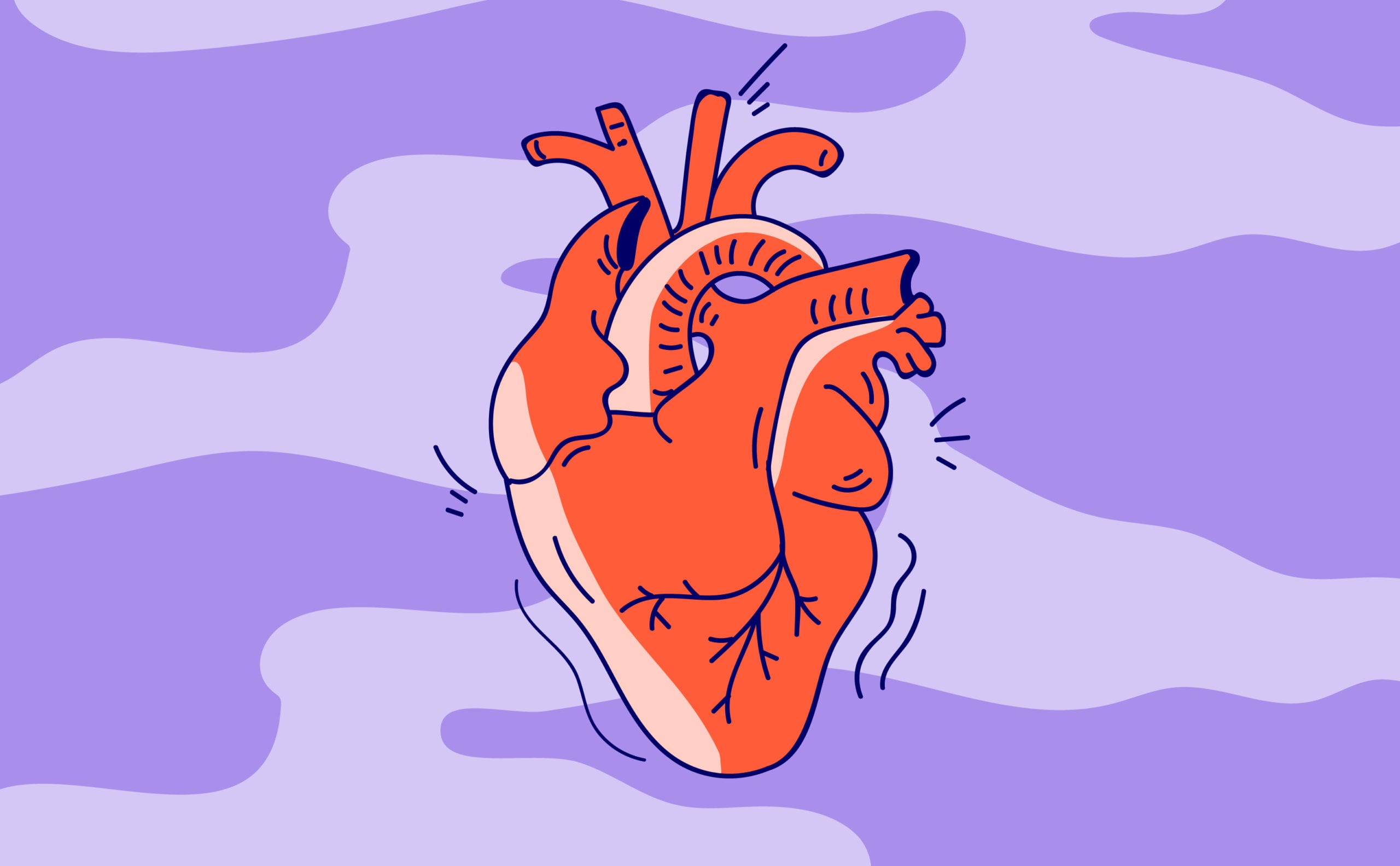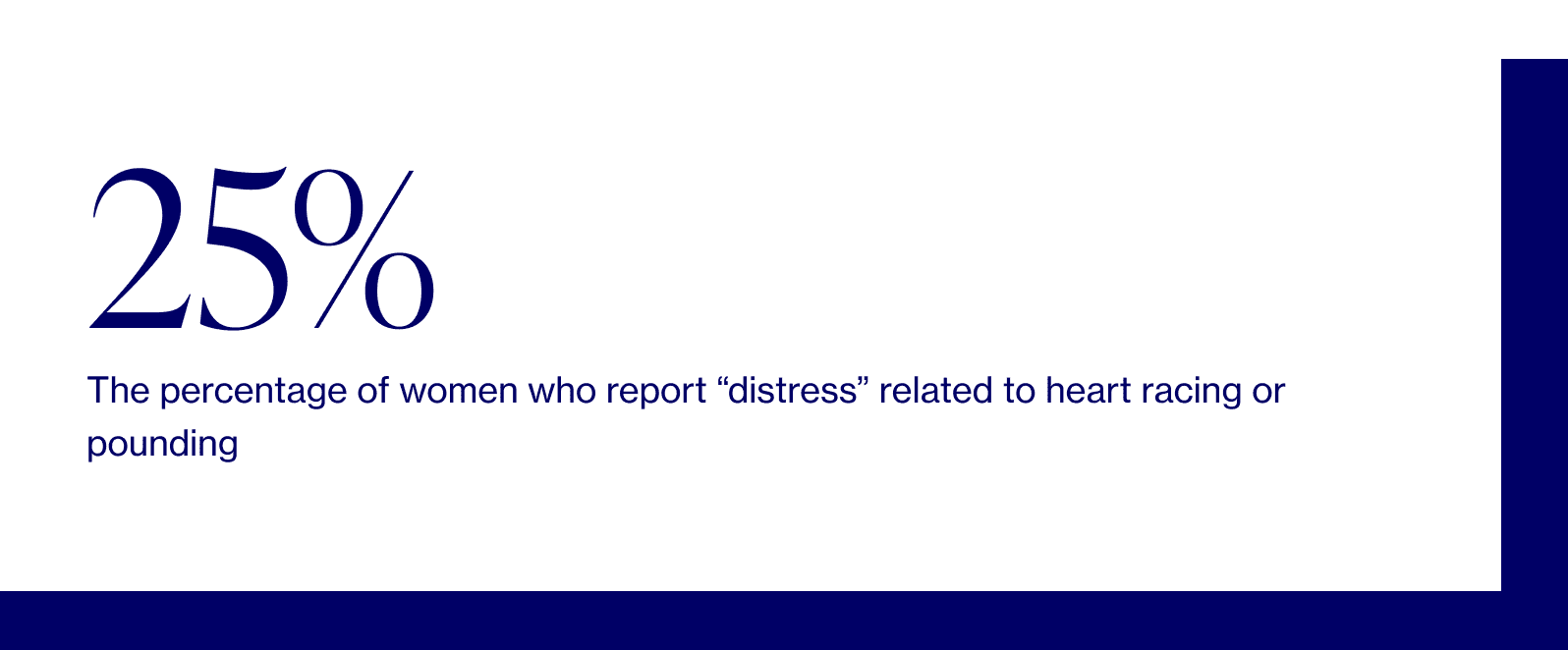We’re all about equipping you with the know-how to understand your symptoms, and we especially emphasize the specific, tangible ways to manage them. Our goal is to empower YOU to take charge of your menopause journey, starting today.
A quick note about product recommendations…Elektra Health is not paid to feature any products. We just like them and think you might too, though we can’t guarantee any results.
Lifestyle
Exercise
Although it sounds counterintuitive (because exercise = racing heart), aerobic activity is necessary for lowering our risk of heart disease. The American Heart Association (AHA) recommends:
- 150 minutes/week of moderate-intensity aerobic activity like walking OR 75 minutes/week of vigorous aerobic activity like jogging (or a combo of both spread throughout the week)
- 2 days/week of moderate-high intensity muscle-strengthening activity via resistance/weights
It’s also important to monitor just how much time we spend sitting.
Unfortunately, a morning workout doesn’t compensate for being sedentary for the remainder of the day.
Even light-intensity activity (walking to get the mail, going downstairs to go to the bathroom, investing in a standing desk) can offset some of the risks of being stationary so much of the day.
Nutrition & Diet
To reduce the chances of heart palpitations, it’s important to limit dietary triggers — we’re lookin’ at you, caffeine and alcohol.
If your palpitations are associated with hot flashes, consider incorporating foods such as soy, flaxseed, and legumes while avoiding spicy foods (if spicy food is a trigger for you — otherwise — no need to avoid it!) You can read more about the science behind why these ingredients help (or hurt) hot flashes in our full guide.
Holistic Practices
The following integrative, holistic therapies can be effective in managing and mitigating the symptoms of hot flashes, which is why we’re recommending them here for heart palpitations as well.
Mindfulness-based stress management
While many alternative therapies haven’t been clinically studied, the impact of mindfulness-based yoga on stress and anxiety has — and the results are promising. Since stress has been identified as a hot flash trigger, it’s worth giving relaxation techniques like meditation or yoga a whirl — while recognizing, of course, that it takes time to cultivate a practice and begin reaping the benefits (this isn’t a “quick fix”)
Breathwork
Heart palpitations often result in sensations of anxiety, which in turn can make palpitations worse –– a lose-lose, we know. In moments like this, different breathing techniques may be used to calm anxiety and even directly increase something called “vagal tone” — the physiologic calming of the nervous system that can result in the lowering of heart rate. Deep, slow breaths, or paced breaths may be used here.
Cognitive Behavioral Therapy (CBT)
CBT involves working with a coach or therapist to recognize and change beliefs — including negative thoughts and worries — that may be triggering or exacerbating hot flashes. That’s the “cognitive” part. And then there’s the “behavioral” part, which helps you develop better habits and a mindset to improve the hot flash experience (vs the hot flash itself). This modality is ideal for those looking to address underlying causes while working towards long-term management.
Acupuncture & Acupressure
Acupuncture is when extremely thin needles are inserted into the skin at strategic points (don’t worry — it doesn’t hurt!) and acupressure is when gentle pressure is used to stimulate certain points on your body. Both techniques have been studied in reducing hot flash severity and decreasing frequency (in addition to promoting sleep and reducing anxiety). A 2016 study, which compared an acupuncture group with a control group, found that hot flash frequency declined by 36% over six months with the acupuncture group, compared to just 6% with the control (no acupuncture).
As far as the effect of these treatments on palpitations of menopause directly, unfortunately studies are of low quality and at best show a trend towards less palpitations with acupressure, but as of now we cannot directly recommend these practices specifically for palpitations.
Sleep environment
When it comes to night sweats, it’s important to keep your bedroom cool. Right around bedtime, our body temperature drops 1-2 degrees, which signals to our internal clock that it’s time to hit the hay. In doctor-speak, this is what’s called “thermoregulation.” We recommend keeping your bedroom at a cool 60 – 67°F and, if that’s not enough, trying the following:
- Cooling sheets made with bamboo, which effectively wicks moisture (read: sweat) from your skin
- Cooling mattress pad or blanket, or a heated blanket for your bed partner (look into one with dual controls if you want to accommodate a bed partner)
- Cooling system for your bed that uses circulating water to maintain a consistent, cool temperature (e.g., this hydro-powered one from ChiliSleep)
- A fan! Simple, low-cost, and effective
Prescriptions and supplements
Fortunately, most palpitations are benign and do not require any therapy. Sometimes, however, they may be prolonged or associated with different conditions requiring medications or other treatments. So, if your palpitations are severe or persistent, we would recommend that you get evaluated.
Hormonal
So can MHT reduce palpitations? Although menopausal hormone therapy (previously referred to as hormone replacement therapy or HRT) will not reduce palpitations from certain causes, IF your palpitations are associated with fluctuating and declining estrogen, MHT can be an effective treatment. We are still not sure 100% whether MHT and specifically estrogen helps by direct effect on heart rate or via control of those pesky hot flashes – or both.
Still have questions? We’re answering them in our full HRT guide or just ask us directly ([email protected]).
Non-Hormonal
Cardiac medications (e.g., beta-blockers like propranolol) can be used, but only under the advice of a healthcare professional or cardiologist in the context of a separately diagnosed or underlying cardiac condition.
We’re always keeping an eye out on emerging research and the latest clinical studies. Subscribe to our weekly Elektra Digest for the latest, science-based info direct to your inbox. Something work well for you that’s not listed here? We want to hear it! Shoot us a note at [email protected]. (We’re human, promise.)
Pro tip #2
Ever heard of HeartMath? This innovative technology helps us understand how our heart rate is tied to things like cognition, emotions, and other menopausal symptoms, palpitations included. Their research has shown that our feelings very significantly affect the heart's rhythm! And, you can use the Heartmath app and sensor to help understand the link between YOUR breathing, heart rate, and emotional state - a very powerful relationship!
Pro tip #3
Oftentimes, heart palpitations alone aren't cause for concern and will go away on their own. But you should still take them seriously and talk to your doctor. It's urgent if palpitations are associated with chest pain, shortness of breath, or lightheadedness. Keep track of when they occur (and if you still get your period, what time of the month), and take note of your medications (prescription & OTC).
Disclaimer: This information is for general educational purposes, and should not be used as a substitute for medical advice, diagnosis, or treatment of any health condition or problem.
As with anything you put into your body, taking dietary supplements can also involve health risks. You should consult a medical professional before taking supplements and inform your doctor about any supplements, as well as any medications you already take, since there may be interactions.
Helpful? Share the wealth!
Share with a friend who deserves evidence-based expertise &
solutions.





